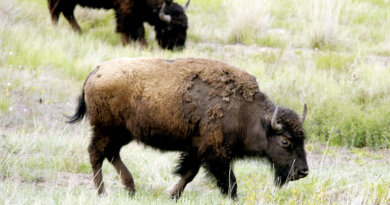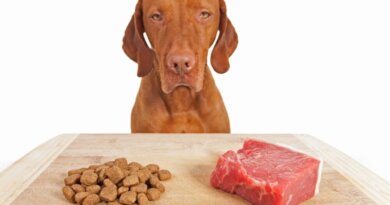I Can’t Get My Overweight Dog to Lose Weight
My Cheena (a Chihuahua/pekinese) is overweight at 11 lb. I have had numerous suggestions on how to get her to lose about 3 or 4 lb. Can you advise me on how to take some weight off her? Her diet is boiled beef, beef marrow bones, and a snack of dehydrated chicken. Yeah, I sometimes cheat, but not as a habit.
Daniel Rivera Brooklyn, NY
Read Dr. Sherry Weaver’s Advice
I have always believed in the weight watchers approach to weight loss. I allow specific food; I provide 20% less. You will see weight loss if you measure the amount of food you feed and give 20% less.
Add some green beans if you have trouble with the sad eyes when the bowl is less full. Green beans are filling, very good for a dog, and have almost no calories. I also use raw carrot sticks very often as a treat.
Good luck!
Dr. Sherry Weaver
Understanding the Health Risks of an Overweight Dog
It is a well-known fact that extra body weight can cause significant damage to a dog’s health, and a canine with excess fat alone can contribute to many underlying health concerns. Dogs 10% over their optimal body weight are considered overweight, and 20% are obese.
More than half of the dogs in America are considered overweight or obese. With this diagnosis, many health risks have been linked to this issue. Below is a list of some of the health concerns:
- Quality of life is decreased
- Risk of cardiovascular disease
- Tolerance for exercise and heat decreases
- Kidney disease
- Arthritis
- Respiratory issues
- Pancreatitis
- Skin Issues
Recognize the Signs of Obesity in Dogs
Recognizing signs of obesity in your dog is crucial for their health and well-being. Some common symptoms of obesity in dogs include excessive weight gain, difficulty moving or exercising, and a lack of energy. You may also notice that your dog has trouble breathing or suffers from joint pain. Addressing these issues immediately requires changing your dog’s diet and exercise routine. Regular visits to the vet can also help you stay on top of your dog’s health and prevent obesity-related health problems.
Identify the Cause of Weight Gain for Your Dog
Identifying the cause of obesity in your dog is vital to help them achieve a healthy weight. Some common causes of obesity in dogs include overfeeding, lack of exercise, and feeding them a diet high in calories and low in nutrients. By identifying the cause of obesity in your dog, you can make the necessary changes to their diet and exercise routine to help them achieve a healthy weight and improve their overall health and well-being.
Consult with a Veterinarian
If you feel your furry friend is overweight, schedule an appointment with your veterinarian. The vet has access to your dog’s medical history and can see increased and decreased weight. Once the cause of weight gain has been pinpointed, your veterinarian can help develop a nutrition and exercise plan that you can implement.
Develop a Weight Loss Plan That Includes Both Diet and Exercise
A weight loss plan for your dog is essential to ensure their overall health and well-being. The plan should include a balanced diet, reduced calorie intake, and increased exercise. Consult your veterinarian to determine the appropriate amount of food and exercise for your dog’s age, breed, and weight. Monitoring your dog’s progress and adjusting the plan as needed is important. Remember that a healthy weight can lead to your furry friend’s longer and happier life.
Choose a High-Quality Dog Food
Dog food with balanced protein, complex carbohydrates, and healthy fats is good quality. This food fulfills all your pet’s nutritional requirements without causing weight gain. Select a brand that lists protein sources within the first two ingredients and avoid chemical preservatives and fillers.
Monitor Portion Sizes and Limit Treats
Some dog owners need clarification about how much to feed their dogs, and they may fail to measure food accurately or be in denial about how much they provide. The size of the cup and bowl used for feeding also affects the food given to a dog, and owners using larger cups and bowls tend to provide more food than smaller ones.
You don’t have to remove treats from your dog’s diet altogether, and you can replace them with healthier options like baby carrots, frozen green beans, pumpkin, or low-calorie dog treats. However, it’s essential to consult with your veterinarian first to ensure these options suit your dog.
Incorporate Regular Exercise Into Your Dog’s Routine
Regular exercise is important for your pet’s health. You can increase activity level by extending your walks. Start with a short distance and gradually increase it over time. Doing this will help your dog build up their endurance for longer walks.
Avoid Feeding Table Scraps
Pets may overeat and become overweight if fed table scraps and fatty treats. Human food is much higher in fat and dense in calories. Even if you think you’re not giving much, those treats can very quickly add up!

Look Into Hiring Help
A professional dog weight loss specialist can provide personalized nutrition, exercise, and general health advice to help your dog shed those extra pounds. They can also monitor progress and adjust the weight loss plan as needed. While it may seem unnecessary, investing in your dog’s health can save you money in the long run by preventing costly health issues.
Enrolling Your Dog in a Weight Loss Program
While it may seem far-fetched, a weight loss camp for your pup could be an effective way to help them shed those extra pounds. Search for local programs in your area or ask other pet parents for referrals.
Work With a Professional Trainer
A professional trainer can teach you how to properly exercise your dog and provide tips for maintaining a healthy weight in the long term. A trainer can significantly improve your dog’s health and quality of life and is an investment worth considering.
Tips For Helping Your Dog Lose Weight
Wondering how to help your dog lose weight? Here are a few things to keep mind as you get started:
Celebrate Small Successes
Celebrating small successes in your dog’s weight loss journey is important to maintain motivation and encourage progress. This could be as simple as enjoying a healthy treat with you dog or going on a fun outing.
Stay Committed
Stay committed once you have a plan and begin helping your dog lose weight. The process takes time, and there is no overnight fix to a healthier and happier pup.
Monitor Progress
Regular monitoring of a dog’s weight loss progress can help ensure that they are losing weight at a healthy rate and that any necessary adjustments can be made to their diet and exercise routine. Use a journal to track what you are feeding and what exercises you are doing, so you can easily communicate with your vet.
Make Adjustments
If your dog is not losing weight despite your efforts, adjusting its diet and exercise routine is essential. Try cutting off table scraps or only feeding them at meal times.
Pet Community
Seek support from a community of pet owners on the same journey as you or who have had similar experiences with their pets.



